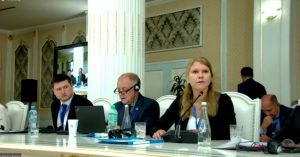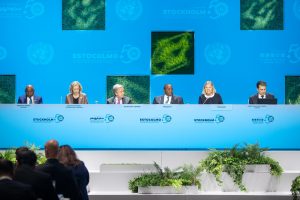Empowerment through education
The Water Dialogues have been an opportunity for Stockholm Water Prize Laureates to be joined by Stockholm Junior Water Prize finalists in conversation on a wide range of topics from groundwater to wastewater to water literacy.
The new Water Dialogues series gives everyone a chance to listen to some of the world’s greatest water experts. This year’s Stockholm Water Prize Laureate Sandra Postel will be joined by influential innovator Pontsho Moletsane who won the Stockholm Junior Water Prize along with two peers in 2005.
On 12 April you can meet them and hear their stories as well as ask any questions you have for these water heroes.
“Water is the basis of life; it is finite; and it has no substitutes.” This total truth distilled into fourteen words is a great example of why Sandra Postel became the most recent Stockholm Water Prize Laureate. Her long and outstanding career has focused on making sense of complex water-related issues. As an author and educator, she has made important contributions to the understanding of some of the greatest challenges of our time and shown that we have the power to find sustainable solutions. Pontsho Moletsane agrees: we have the power to be part of the solution.
Pontsho Moletsane was awarded the Stockholm Junior Water Prize in 2005 for developing a revolutionary system to cut water usage in small-scale irrigation. He won along with his peers, Motebele Moshodi and Sechaba Ramabenyane, representing South Africa. Ms. Buyelwa Sonjica, South African Water Minister at the time noted that “This proves beyond reasonable doubt that any child given an opportunity could rise to any challenge”.
Beyond being an inspiring example of young innovators, Pontsho and his peers had made their invention accessible – crucial to helping rural communities. The nominating committee noted that their invention was both “technically simple and inexpensive to produce”. This would enable communities to use limited water resources more efficiently, to improve food production and to contribute to eradication of poverty.
Pontsho’s water journey did not stop in 2005, in fact it was only just starting. He has taken part in several initiatives and continues to advocate for water education especially when it comes to how we can use water resources responsibly. Pontsho believes that we can improve efficiency of water use by empowering people with knowledge. Most of all he believes we cannot back down from the challenges we face, nor make peace with them but be part of the solution.
Sandra shares Pontsho’s optimism, albeit in a more guarded manner. We can make a difference. Perhaps not always through invention and innovation but through something as simple as not throwing a cup of coffee away. Every time we throw a cup of coffee away, “we’re pouring the equivalent of 130 litres of water down the drain, because of the water required to grow those coffee beans” Sandra explains Moreover, if those coffee beans come from Ethiopia, we are impacting water sources there. Facts and realizations like these are the starting blocks for educating and empowering generations of water heroes.
Join these two great water minds on 12 April for a dialogue across continents and generations.






